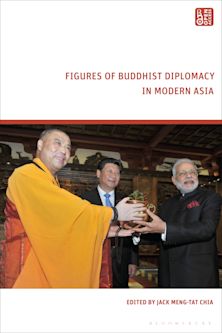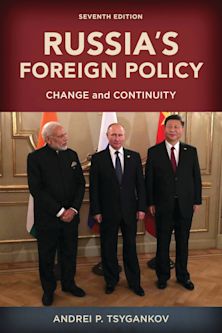- Home
- ACADEMIC
- Politics & International Relations
- Foreign Policy and Diplomacy
- Italy in the Post-Cold War Order
Italy in the Post-Cold War Order
Adaptation, Bipartisanship, Visibility
Maurizio Carbone (Anthology Editor) , Roberto Belloni (Contributor) , Valter Coralluzzo (Contributor) , Osvaldo Croci (Contributor) , Jason W. Davidson (Contributor) , Raffaella Del Sarto (Contributor) , Paolo Foradori (Contributor) , Ernesto Gallo (Contributor) , Christopher Hill (Contributor) , James L. Newell (Contributor) , Leopoldo Nuti (Contributor) , Vittorio Emanuele Parsi (Contributor) , Lucia Quaglia (Contributor) , Nathalie Tocci (Contributor) , Luca Ratti (Contributor) , Paolo Rosa (Contributor) , James Walston (Contributor)
Italy in the Post-Cold War Order
Adaptation, Bipartisanship, Visibility
Maurizio Carbone (Anthology Editor) , Roberto Belloni (Contributor) , Valter Coralluzzo (Contributor) , Osvaldo Croci (Contributor) , Jason W. Davidson (Contributor) , Raffaella Del Sarto (Contributor) , Paolo Foradori (Contributor) , Ernesto Gallo (Contributor) , Christopher Hill (Contributor) , James L. Newell (Contributor) , Leopoldo Nuti (Contributor) , Vittorio Emanuele Parsi (Contributor) , Lucia Quaglia (Contributor) , Nathalie Tocci (Contributor) , Luca Ratti (Contributor) , Paolo Rosa (Contributor) , James Walston (Contributor)
This product is usually dispatched within 1 week
- Delivery and returns info
-
Free CA delivery on orders $40 or over
You must sign in to add this item to your wishlist. Please sign in or create an account
Description
There are little doubts that Italy has attempted to play a more assertive role in the international arena since the end of the Cold War. During the first forty years of its Republican history, conditioned by both the polarized international context and an antagonistic domestic political system, Italy delegated its main choices in international affairs to external actors, most notably NATO and the European Union. The transition from a bipolar to a unipolar/multipolar world order provided Italy with new opportunities to pursue its political and commercial interests more autonomously, as well as new responsibilities, to actively contribute to solving conflicts and addressing new global threats. At the same time, the collapse of the traditional parties (linked to the fall of the Berlin wall and the Clean Hands enquiries) and the changes of the electoral law (from a proportional representation into a quasi-majoritarian system) generated two heterogeneous coalitions which have regularly alternated in power, but do not always share the same views and approaches-with differences at times of form, and more often of substance.
Against this background, Italy in the Post-Cold War Order: Adaptation, Bipartisanship, Visibility, edited by Maurizio Carbone, seeks to explain the evolution of Italy's international action over a twenty-year span (1989–2009). Three central questions are addressed. First, how does Italy adapt to transformations of the international system? Second, how does its ever-changing political system influence Italy's choices in foreign relations? Third, how do domestic structures constrain (or enable) Italy's place on the world stage? To answer these questions, this book consists of two broad parts. The first part sets the context and discusses issues 'horizontally,' focusing on foreign policy, security and defense policy, development cooperation, and multilateral action. The second part, which takes a 'vertical' approach, discusses Italy's relations with key countries and regions of the world
Table of Contents
List of Abbreviations
Acknowledgements
Foreword
Introduction: Understanding Italy's Role on the World Stage
Part I: Contexts and Perspectives
Chapter 1: Italian Foreign Policy in the Cold War: A Constant Search for Status
Chapter 2: Italian Politics after the End of the Cold War: The Continuation of a Two-Level Game
Chapter 3: Italy as a Foreign Policy Actor: The Interplay of Domestic and International Factors
Chapter 4: Italy as a Security Actor: New Resolve and Old Inadequacies
Chapter 5: Italy as a Development Actor: A Tale of Bipartisan Failure
Chapter 6: Italy as a Multilateral Actor: The Inescapable Destiny of a Middle Power
Part II: Countries and Regions
Chapter 7: Italy and the US: Prestige, Peace, and the Transatlantic Balance
Chapter 8: Italy and the EU: Seeking Visibility, Fearing Exclusion
Chapter 9: Italy, China and Russia: Costs and Benefits of Building Bridges
Chapter 10: Italy in the Mediterranean: Between Europeanism and Atlanticism
Chapter 11: Italy in the Balkans: An Emerging Actor in its Neighborhood
Chapter 12: Italy in Latin America and South Asia: Struggling to Become More Visible
Conclusion: After the Cold War, a World of Opportunity and Greater Responsibility for Italy too
Index
About the Contributors
Product details
| Published | Feb 24 2011 |
|---|---|
| Format | Hardback |
| Edition | 1st |
| Extent | 294 |
| ISBN | 9780739137116 |
| Imprint | Lexington Books |
| Dimensions | 241 x 163 mm |
| Publisher | Bloomsbury Publishing |
About the contributors
Reviews
-
This book offers new perspectives in the analysis of the ways in which domestic politics and foreign policy are connected. Its implications therefore extend far beyond the single case-Italy-on which it is based, making it essential reading for comparativists and international relations scholars generally.
Leonardo Morlino, Former President, International Political Science Association (IPSA)
-
This book provides a variety of insights into the new role acquired by Italy in the post-cold war world. Commendably, it examines the country not only with regard to the Atlanticism-Europeanism dichotomy but also in terms of its action in various areas of the world.
Alberta M. Sbragia, University of Pittsburgh
-
In tackling its problems, in the now overlapping spheres of domestic and foreign policy, Italy needs an ever more developed and sophisticated public debate. Academic work is not the only source of ideas and information, but its long-term contribution to the knowledge community is indispensable. The essays in this book are a most welcome sign of the interest in Italian foreign policy to be found among the younger generation of International Relations scholars and of the expertise they can bring to bear.
Christopher Hill, University of Cambridge



































